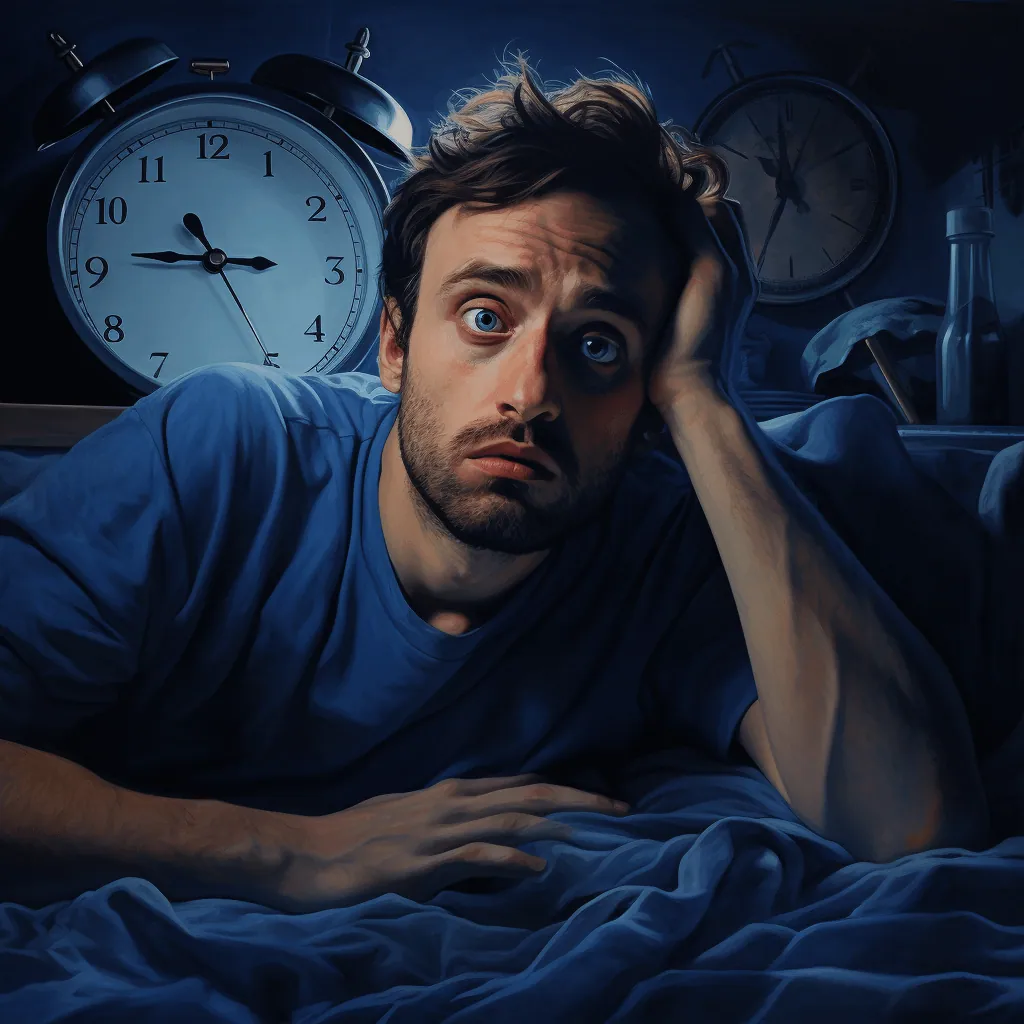In the fast-paced modern world, achieving a peaceful night’s sleep can often feel like an elusive dream. The quiet hours meant for rejuvenation and rest often become battlegrounds of tossing, turning, and restless thoughts. Insomnia, the persistent inability to fall asleep or stay asleep, is a common and disruptive sleep disorder that affects millions of individuals worldwide. Its reach goes beyond the realm of the physical, seeping into the territories of mental and emotional well-being. In this article, we embark on a journey to understand the intricacies of insomnia and its profound impact on mental health. From unraveling its causes to unveiling effective strategies, we will explore the comprehensive landscape of conquering insomnia for the sake of attaining not only better sleep but also a healthier mind. Join us as we delve into the science, solutions, and significance of restful sleep in nurturing our mental and emotional equilibrium.
Table of Contents
- The Silent Epidemic: Understanding the Prevalence of Insomnia
- The Sleep-Mental Health Connection: Exploring the Deep Interplay
- Types of Insomnia: Unraveling the Complex Web of Sleeplessness
- A Nighttime Affliction: Symptoms and Signs of Insomnia
- Root Causes: Identifying Triggers Behind Sleep Disruptions
- The Mind’s Restless Nights: How Anxiety and Stress Fuel Insomnia
- Technology’s Role: Screen Time, Sleep, and Mental Well-being
- Holistic Approaches: Lifestyle Changes for Restful Nights
- Sleep Hygiene: Building Healthy Sleep Rituals for Better Zzz’s
- Professional Help: When and How to Seek Treatment for Insomnia
- Cognitive Behavioral Therapy for Insomnia (CBT-I): A Game-Changer
- Medications and Their Implications: Navigating the Treatment Landscape
- Sleep and Mental Resilience: Unveiling the Link for Overall Health
- The Mind-Body Connection: Nurturing Mental Health Through Sleep
- A Good Night’s Sleep: Your Path to Wellness and Mental Vitality
- Frequently Asked Questions

The Silent Epidemic: Understanding the Prevalence of Insomnia
In a world that never sleeps, the silent epidemic of insomnia has become a pervasive concern affecting countless individuals. While often dismissed as a minor inconvenience, the impact of insomnia on both mental and physical health is profound. This article sheds light on the prevalence of insomnia, uncovering the hidden dimensions of a condition that disrupts sleep patterns and challenges overall well-being.
Insomnia’s Ubiquity: A Global Perspective
Insomnia is not confined by borders or demographics—it’s a global issue. A study revealed that insomnia affects approximately 30% of the general population, highlighting its wide-reaching impact. This sleep disorder transcends age, gender, and cultural backgrounds, making it a pressing concern for public health worldwide.
Variations in Severity and Duration
Insomnia isn’t a one-size-fits-all condition; its severity and duration vary. While some individuals experience transient insomnia due to temporary stressors, others battle chronic insomnia, persisting for months or even years. Understanding the spectrum of insomnia is crucial for addressing its diverse effects on mental and physical health.
The Connection to Mental Health
Insomnia and mental health are intrinsically linked, forming a vicious cycle. A study established that insomnia is a significant risk factor for developing various mental health disorders, including depression and anxiety. Conversely, these disorders can exacerbate insomnia, creating a challenging interplay that impacts overall well-being.
The Pervasive Impact on Daily Life
Insomnia is more than a mere inconvenience; its consequences ripple through daily life. Impaired cognitive function, reduced concentration, and increased irritability become a norm for those struggling with sleeplessness. The strain on work performance, relationships, and overall quality of life is evident, emphasizing the urgency of addressing insomnia.
As the silent epidemic of insomnia prevails, understanding its prevalence is the first step toward effective intervention. Recognizing its ubiquity, variations in severity, connection to mental health, and pervasive impact underscores the urgency of addressing this condition for the betterment of global health and well-being.
The Sleep-Mental Health Connection: Exploring the Deep Interplay
Sleep and mental health are inextricably linked, forming a complex relationship that significantly impacts overall well-being. In the pursuit of conquering insomnia and improving mental health, understanding this deep interplay is essential. This article delves into the intricate connection between sleep and mental health, shedding light on how one affects the other and offering insights for better sleep and improved emotional well-being.
Bidirectional Influence
The relationship between sleep and mental health is bidirectional—each affects the other in profound ways. A study demonstrated that poor sleep quality increases the risk of developing mental health disorders such as depression and anxiety. Conversely, individuals with mental health disorders often experience disrupted sleep patterns, exacerbating their condition. This cyclical influence highlights the importance of addressing both sleep and mental health in tandem.
The Role of Neurotransmitters
Neurotransmitters, the brain’s chemical messengers, play a pivotal role in the sleep-mental health connection. Research by identified that imbalances in neurotransmitters like serotonin and dopamine, associated with mood regulation, impact both sleep quality and mental health. Disrupted sleep can alter these neurotransmitter levels, contributing to the onset or exacerbation of mental health disorders.
Stress and Cortisol
Stress is another key player in the intricate dance between sleep and mental health. Chronic stress triggers the release of cortisol, a stress hormone that, when elevated, disrupts sleep patterns. A study found that the bidirectional relationship between stress and poor sleep contributes to the development of mood disorders. Managing stress through relaxation techniques and cognitive strategies can positively impact both sleep and mental well-being.
Strategies for Balance
Recognizing the sleep-mental health connection opens the door to holistic well-being. Implementing sleep hygiene practices, such as maintaining a consistent sleep schedule and creating a comfortable sleep environment, can improve sleep quality and mental health. Additionally, cognitive behavioral therapy for insomnia (CBT-I) offers evidence-based techniques to address both insomnia and associated mental health challenges.
The intricate connection between sleep and mental health underscores the need for comprehensive care. Understanding the bidirectional influence, neurotransmitter roles, and the impact of stress empowers individuals to make informed choices for improved sleep and emotional well-being. By recognizing and addressing this deep interplay, the journey toward conquering insomnia and achieving mental health becomes a more promising endeavor.
Types of Insomnia: Unraveling the Complex Web of Sleeplessness
Insomnia, often underestimated, can manifest in various forms, affecting sleep quality and overall mental health. Understanding the different types of insomnia is crucial for effectively addressing this widespread sleep disorder. This article delves into the complex web of sleeplessness by exploring the types of insomnia and their impact on mental well-being.
1. Acute Insomnia: Brief Sleep Disturbance
Acute insomnia is characterized by short-term sleep difficulties typically caused by stressful life events or changes. It lasts for a few nights to a few weeks and often resolves once the underlying stressor is addressed. However, if not managed, acute insomnia can transition to chronic insomnia.
2. Chronic Insomnia: Persistent Sleep Challenges
Chronic insomnia is a more enduring condition, persisting for at least three nights a week for three months or longer. Its causes are multifaceted and can include psychological, medical, and lifestyle factors. Chronic insomnia not only impacts sleep but can also lead to cognitive impairments, mood disturbances, and reduced quality of life.
3. Onset Insomnia: Difficulty Falling Asleep
Individuals with onset insomnia experience difficulty falling asleep at the beginning of the night. Racing thoughts, stress, and anxiety can contribute to this type of sleeplessness. Onset insomnia can perpetuate a cycle of frustration and worry surrounding sleep.
4. Maintenance Insomnia: Waking Up During the Night
Maintenance insomnia involves waking up during the night and struggling to fall back asleep. This fragmented sleep can result from medical conditions, pain, or psychological factors. It leaves individuals feeling tired and irritable during the day.
5. Comorbid Insomnia: Linked with Other Disorders
Comorbid insomnia occurs alongside other medical or psychological conditions. For instance, insomnia is often seen in conjunction with depression, anxiety, or chronic pain. Addressing both the underlying condition and sleep disturbances is crucial for effective management.
Studies Supporting the Complexity of Insomnia:
A study explored the prevalence and factors associated with insomnia in a large sample. The findings highlighted the intricate relationship between insomnia, mental health disorders, and other medical conditions. This emphasizes the need for tailored approaches to address different types of insomnia.
Another study investigated the natural history of insomnia and its impact on daily functioning. The results showed that chronic insomnia is associated with impaired cognitive and emotional functioning, demonstrating the far-reaching effects of sleeplessness on mental well-being.
Understanding the diverse types of insomnia is a crucial step in conquering sleep challenges and improving mental health. Whether it’s acute, chronic, onset, maintenance, or comorbid insomnia, recognizing the specific patterns and underlying causes enables individuals to seek appropriate strategies for better sleep and enhanced overall well-being.
A Nighttime Affliction: Symptoms and Signs of Insomnia
Insomnia, a common sleep disorder, can significantly impact both physical and mental well-being. Recognizing the symptoms and signs of insomnia is essential for early intervention and effective management. In this article, we delve into the various manifestations of insomnia and their implications for mental health.
1. Difficulty Falling Asleep: Onset Insomnia
One of the hallmark signs of insomnia is experiencing difficulty falling asleep at the beginning of the night. Individuals with onset insomnia may toss and turn in bed, plagued by racing thoughts, anxiety, or stress. This struggle to initiate sleep can lead to frustration and a negative association with bedtime.
2. Frequent Awakenings: Maintenance Insomnia
Maintenance insomnia involves waking up multiple times during the night and struggling to fall back asleep. These awakenings can disrupt sleep continuity, leaving individuals feeling fatigued during the day. Factors such as pain, discomfort, or racing thoughts contribute to this pattern.
3. Early Morning Waking: Terminal Insomnia
Terminal insomnia is characterized by waking up too early in the morning and being unable to return to sleep. This early awakening often leaves individuals feeling groggy and unrested throughout the day, impacting their overall well-being.
4. Non-Restorative Sleep: Feeling Unrefreshed
Even if individuals with insomnia manage to sleep for an adequate duration, they may wake up feeling unrefreshed. This lack of restorative sleep can lead to daytime sleepiness, difficulty concentrating, and irritability.
5. Daytime Impairment: Cognitive and Emotional Effects
Insomnia doesn’t just affect nighttime sleep; it extends into the daytime as well. Individuals with insomnia often experience cognitive impairments such as memory problems, difficulty concentrating, and decreased problem-solving abilities. Emotional effects include mood disturbances, irritability, and heightened stress levels.
Studies Highlighting Insomnia’s Impact:
A study examined the relationship between insomnia and cognitive functioning. The findings indicated that insomnia is associated with deficits in cognitive performance, particularly in tasks related to attention and memory.
Another study explored the connection between insomnia and emotional well-being. The research revealed that insomnia is a risk factor for developing mood disorders such as depression and anxiety, emphasizing the bidirectional relationship between sleep and mental health.
Recognizing the symptoms and signs of insomnia is pivotal for addressing sleep disturbances and their impact on mental health. From difficulties falling asleep to daytime cognitive and emotional impairments, understanding the multifaceted nature of insomnia is a crucial step in its management and achieving better sleep and overall well-being.
Root Causes: Identifying Triggers Behind Sleep Disruptions
Sleep disruptions, often linked to insomnia, can have a profound impact on mental health and overall well-being. Understanding the root causes of these disruptions is crucial for effective management and achieving restorative sleep. In this article, we explore the various triggers that can lead to sleep disturbances and their implications.
1. Stress and Anxiety
Stress and anxiety are common culprits behind sleep disruptions. Racing thoughts, worry, and an overactive mind can make it challenging to relax and fall asleep. The cortisol release associated with stress can also interfere with the natural sleep cycle, leading to fragmented or insufficient sleep.
2. Lifestyle Factors
Lifestyle choices such as irregular sleep schedules, excessive caffeine intake, and lack of physical activity can contribute to sleep disruptions. Disrupting the body’s internal clock (circadian rhythm) can lead to difficulties falling asleep and staying asleep.
3. Electronic Devices
The blue light emitted by smartphones, tablets, and computers can suppress the production of melatonin, a hormone that regulates sleep. Using electronic devices before bedtime can interfere with the body’s natural ability to wind down, making it harder to fall asleep.
4. Environmental Factors
Environmental factors such as noise, temperature, and an uncomfortable mattress or pillow can impact sleep quality. A bedroom that is not conducive to sleep can lead to frequent awakenings and restlessness during the night.
5. Medical Conditions
Certain medical conditions, such as chronic pain, restless leg syndrome, and sleep apnea, can disrupt sleep. Pain or discomfort can make it difficult to find a comfortable sleeping position, while sleep apnea can lead to frequent awakenings due to breathing interruptions.
Studies Highlighting Triggers of Sleep Disruptions:
A study investigated the relationship between stress and sleep disturbances. The findings indicated that high levels of stress were associated with both subjective and objective sleep disruptions, highlighting the impact of psychological factors on sleep quality.
In a study, the effects of evening exposure to electronic devices on sleep were examined. The results demonstrated that exposure to light-emitting devices before bedtime delayed the circadian rhythm and suppressed melatonin production, leading to difficulties falling asleep.
Identifying the root causes of sleep disruptions is essential for devising effective strategies to conquer insomnia and improve overall mental health. Whether it’s managing stress, adopting healthier lifestyle habits, or creating a sleep-conducive environment, addressing these triggers can pave the way for restorative sleep and enhanced well-being.
The Mind’s Restless Nights: How Anxiety and Stress Fuel Insomnia
In the pursuit of better sleep and improved mental health, understanding the intricate connection between anxiety, stress, and insomnia is paramount. This article delves into the profound impact of anxiety and stress on sleep patterns, shedding light on their role in fueling the widespread issue of insomnia.
1. Anxiety and the Sleep-Wake Cycle
Anxiety, characterized by persistent worry and unease, can significantly disrupt the sleep-wake cycle. Racing thoughts, constant anticipation, and apprehension about the future often lead to difficulty falling asleep or staying asleep. As individuals lie in bed, their minds can become a breeding ground for anxious thoughts, making it challenging to achieve the calmness necessary for sleep initiation.
2. Stress as a Sleep Saboteur
Stress is a potent trigger for insomnia, as it triggers the body’s “fight or flight” response. The release of stress hormones, such as cortisol, can elevate alertness and physiological arousal, making it difficult for the body to wind down naturally at night. This heightened state of arousal can lead to fragmented sleep and early awakenings.
3. The Vicious Cycle
Anxiety, stress, and insomnia often create a self-perpetuating cycle. Sleep deprivation resulting from anxiety and stress can intensify emotional distress and reduce one’s ability to cope effectively, leading to even higher levels of anxiety and stress. This cycle can gradually escalate, resulting in chronic insomnia and worsening mental health.
Studies Highlighting Anxiety and Stress as Insomnia Triggers:
A study explored the relationship between insomnia, anxiety, and depression. The findings revealed that anxiety was a strong predictor of insomnia onset and persistence. Individuals with higher anxiety levels were more likely to experience chronic sleep disturbances.
In another study, the bidirectional relationship between stress and insomnia was investigated. The study demonstrated that higher stress levels during the day were associated with difficulty falling asleep and staying asleep at night, highlighting the role of stress as a driver of sleep disruptions.
Recognizing the integral role of anxiety and stress in insomnia is essential for addressing sleep disturbances and promoting mental well-being. Strategies that target anxiety and stress management can play a pivotal role in breaking the cycle of sleep disruption and fostering restorative sleep patterns.
Technology’s Role: Screen Time, Sleep, and Mental Well-being
In the modern era, technology has become an integral part of daily life, influencing various aspects including sleep patterns and mental well-being. This article explores the intricate relationship between screen time, sleep quality, and mental health, shedding light on the potential impacts of excessive technology use on our ability to conquer insomnia and achieve better mental well-being.
1. The Digital Dilemma
The prevalence of smartphones, tablets, and computers has led to increased screen time, especially before bedtime. The blue light emitted by screens can disrupt the body’s natural production of melatonin, the sleep-inducing hormone, leading to difficulty falling asleep and sleep disturbances.
2. Sleep Disruptions
Engaging in technology-related activities before bed, such as scrolling through social media or watching videos, can activate the brain and hinder the transition into a relaxed state conducive to sleep. The stimulating content and exposure to bright screens can delay sleep onset, leaving individuals tossing and turning during the night.
3. Mental Health Implications
Excessive screen time has also been associated with mental health issues, including anxiety and depression. The constant connectivity to digital devices can lead to feelings of social isolation, comparison, and information overload, contributing to heightened stress levels and negatively impacting mental well-being.
Studies Highlighting the Impact of Screen Time on Sleep and Mental Health:
A study investigated the relationship between screen time and sleep quality in adolescents. The findings demonstrated a significant association between higher screen time and poorer sleep quality, highlighting the detrimental effects of technology use on sleep patterns.
In another study , the link between screen time and mental health among adolescents was explored. The study revealed that increased screen time, particularly on social media, was correlated with higher rates of depressive symptoms and suicidal thoughts, underlining the importance of managing technology use for better mental well-being.
As technology continues to shape our daily lives, it’s crucial to recognize its impact on sleep quality and mental health. By implementing mindful strategies to limit screen time before bed and fostering healthy technology habits, individuals can work towards conquering insomnia, improving sleep patterns, and promoting better mental well-being.
Holistic Approaches: Lifestyle Changes for Restful Nights
Struggling with insomnia can take a toll on both physical and mental well-being. While medications and therapy can offer relief, adopting holistic lifestyle changes can play a significant role in conquering insomnia and improving overall sleep quality. This article delves into the realm of holistic approaches, shedding light on how simple lifestyle changes can lead to restful nights and enhanced mental health.
1. Prioritize Sleep Hygiene
Creating a sleep-conducive environment is paramount. Keep the bedroom cool, dark, and quiet, and invest in a comfortable mattress and pillows. Establish a consistent sleep schedule by going to bed and waking up at the same times each day, even on weekends.
2. Mindful Nutrition
Certain foods and beverages can disrupt sleep, while others promote relaxation. Limit caffeine intake in the afternoon and evening, and avoid heavy or spicy meals close to bedtime. Opt for light snacks like bananas, whole-grain cereal, or herbal tea, which contain sleep-promoting nutrients.
3. Physical Activity
Regular exercise can improve sleep quality, but timing matters. Engage in moderate exercise earlier in the day, avoiding vigorous workouts close to bedtime. Yoga and gentle stretches before bed can help relax the body and mind.
4. Stress Reduction Techniques
Chronic stress can contribute to insomnia. Engage in relaxation techniques such as deep breathing, meditation, or progressive muscle relaxation to calm the mind and promote a sense of tranquility before sleep.
Studies Highlighting the Efficacy of Holistic Approaches:
A study examined the effects of sleep hygiene education on sleep quality in individuals with insomnia. The results indicated that participants who received sleep hygiene education reported improved sleep quality and reduced insomnia symptoms.
In a randomized controlled trial, the impact of mindfulness meditation on insomnia was explored. The findings revealed that mindfulness meditation significantly improved sleep quality and reduced insomnia symptoms among participants.
Conquering insomnia involves a multifaceted approach that goes beyond medications. By embracing holistic lifestyle changes, individuals can create a conducive environment for restful sleep and positively impact their mental health. From practicing sleep hygiene to adopting stress reduction techniques, these simple adjustments can pave the way to rejuvenating sleep and better overall well-being.
Insomnia is more than a mere inconvenience; its consequences ripple through daily life. Impaired cognitive function, reduced concentration, and increased irritability become a norm for those struggling with sleeplessness.
Sleep Hygiene: Building Healthy Sleep Rituals for Better Zzz’s
In a world that never sleeps, getting quality rest can be a challenge. Enter sleep hygiene – a collection of practices that can pave the way to a restful night’s sleep and improved mental health. This article dives into the realm of sleep hygiene, exploring how cultivating healthy sleep rituals can lead to better sleep and overall well-being.
1. Consistent Sleep Schedule
Setting a regular sleep schedule is crucial. Try to go to bed and wake up at the same times every day, even on weekends. Consistency helps regulate your body’s internal clock, making it easier to fall asleep and wake up naturally.
2. Create a Sleep-Conducive Environment
Your sleep environment plays a pivotal role. Ensure your bedroom is dark, quiet, and cool. Invest in comfortable bedding and consider blackout curtains to block out external light. Keep electronics out of the bedroom to eliminate distractions.
3. Mindful Pre-Bedtime Routine
Engaging in relaxing activities before bed can signal your body that it’s time to wind down. Consider reading a book, taking a warm bath, or practicing gentle yoga or meditation to calm your mind.
4. Watch What You Eat and Drink
Limit caffeine and alcohol intake, especially in the hours leading up to bedtime. Opt for light, easily digestible snacks if needed. Avoid heavy or spicy meals close to bedtime that could cause discomfort.
5. Limit Screen Time
The blue light emitted by screens can interfere with your body’s production of melatonin, a hormone that regulates sleep. Aim to reduce screen time at least an hour before bed to promote better sleep.
Studies Highlighting the Importance of Sleep Hygiene:
In a study, researchers assessed the impact of sleep hygiene education on sleep quality in college students. The results demonstrated that participants who received sleep hygiene education reported significant improvements in sleep quality and daytime functioning.
Another study investigated the association between sleep hygiene behaviors and insomnia symptoms in a population of adults. The findings indicated that practicing good sleep hygiene was associated with reduced insomnia symptoms and better sleep quality.
The path to conquering insomnia begins with nurturing healthy sleep hygiene habits. By following consistent sleep schedules, creating a peaceful sleep environment, and adopting mindful pre-bedtime routines, you can lay the foundation for better sleep and enhanced mental well-being. Remember, building these rituals takes time, so be patient and persistent as you cultivate a healthier sleep routine.
Professional Help: When and How to Seek Treatment for Insomnia
Insomnia can cast a long shadow over your overall well-being, affecting not only your sleep but also your mental health and daily functioning. When sleeplessness becomes a persistent issue, seeking professional help can be a game-changer. This article sheds light on the importance of seeking treatment for insomnia, when to do so, and the available options.
1. Recognizing the Need
Persistent insomnia can have a profound impact on your mental and physical health. If you find yourself struggling to fall asleep, waking up frequently during the night, or feeling fatigued during the day, it might be time to consider seeking professional help.
2. Consulting a Healthcare Provider
Start by scheduling a visit to your healthcare provider. They can conduct a thorough evaluation of your sleep patterns, medical history, and any underlying conditions that might contribute to your insomnia. This evaluation can help determine the appropriate course of action.
3. Cognitive-Behavioral Therapy for Insomnia (CBT-I)
CBT-I is a highly effective, evidence-based approach to treating insomnia. It involves identifying and modifying negative thought patterns and behaviors that contribute to sleeplessness. A trained therapist can guide you through CBT-I techniques to improve your sleep.
4. Medications
In some cases, healthcare providers might prescribe medications to help manage insomnia. These medications should be used under close medical supervision and for short durations, as they can carry potential risks and side effects.
Studies Highlighting the Importance of Seeking Treatment:
Another emphasized the significance of early intervention for insomnia. It highlighted that untreated insomnia can lead to a chronic course, reinforcing the importance of seeking timely treatment.
If insomnia is disrupting your life, don’t suffer in silence. Seeking professional help is a proactive step toward reclaiming your sleep and overall well-being. Whether through cognitive-behavioral therapy, medications, or a combination of approaches, there are effective strategies to help you conquer insomnia and achieve better sleep and mental health.
Cognitive Behavioral Therapy for Insomnia (CBT-I): A Game-Changer
When insomnia disrupts your nights and affects your days, it’s easy to feel trapped in a cycle of sleeplessness. However, there’s a powerful tool that can break this cycle and bring back restful nights: Cognitive Behavioral Therapy for Insomnia (CBT-I). This article delves into the transformative potential of CBT-I in conquering insomnia and improving overall mental health.
1. Understanding CBT-I
CBT-I is a structured, evidence-based therapeutic approach aimed at addressing the thoughts, behaviors, and patterns that contribute to insomnia. Unlike medications that offer temporary relief, CBT-I equips you with long-lasting skills to manage and overcome sleep difficulties.
2. Targeting Negative Thought Patterns
CBT-I recognizes the role of negative thought patterns in perpetuating insomnia. Through cognitive restructuring, you’ll learn to identify and challenge these thoughts, replacing them with more realistic and positive perspectives about sleep.
3. Behaviors that Promote Sleep
Sleep hygiene is a key component of CBT-I. You’ll work on establishing a sleep-conducive environment and routines that signal to your body that it’s time to wind down. This might involve limiting screen time before bed, creating a comfortable sleep space, and practicing relaxation techniques.
4. Sleep Restriction and Stimulus Control
CBT-I often includes techniques like sleep restriction and stimulus control. Sleep restriction involves initially limiting time spent in bed to match actual sleep time, gradually increasing it as sleep improves. Stimulus control helps strengthen the association between the bed and sleep, reducing time spent awake in bed.
Studies Highlighting the Efficacy of CBT-I:
CBT-I offers a holistic approach to tackling insomnia by addressing the thoughts, behaviors, and habits that contribute to sleep disturbances. Its effectiveness and durability make it a game-changer for those seeking a lasting solution to their sleep problems. Through CBT-I, you can regain control over your sleep, improve your mental health, and pave the way for more restful nights and brighter days.
Medications and Their Implications: Navigating the Treatment Landscape
In the pursuit of better sleep and improved mental health, medications often come into play as a potential solution for insomnia. This article delves into the world of insomnia medications, their implications, and factors to consider when navigating the treatment landscape.
1. Understanding Insomnia Medications
Insomnia medications are designed to help individuals fall asleep faster, stay asleep longer, or both. They can be classified into different categories, including over-the-counter (OTC) sleep aids and prescription medications. OTC sleep aids usually contain antihistamines that induce drowsiness, while prescription medications target various neurotransmitters to regulate sleep-wake cycles.
2. Short-Term vs. Long-Term Use
Medications can provide short-term relief for acute insomnia episodes caused by situational factors. However, long-term use of some medications can lead to tolerance, dependency, and rebound insomnia when discontinued.
3. Potential Side Effects
Like any medications, insomnia drugs can have side effects ranging from mild to severe. These may include dizziness, daytime drowsiness, memory problems, and even allergic reactions. It’s crucial to discuss potential side effects with your healthcare provider before starting any medication.
4. The Role of Behavioral Approaches
Medications are not the only option for managing insomnia. In fact, a combination of cognitive-behavioral techniques and medications may yield the best results. Cognitive Behavioral Therapy for Insomnia (CBT-I) has shown long-lasting benefits without the risk of medication-related side effects.
Studies Highlighting Implications of Insomnia Medications:
A study examined the use of zolpidem (a common insomnia medication) and found that while it improved sleep, it was associated with next-day cognitive and psychomotor impairment.
A systematic review evaluated the efficacy and safety of various medications for insomnia. They concluded that while medications provided modest improvements in sleep, long-term benefits and safety concerns needed further exploration.
Insomnia medications can offer relief, especially in the short term. However, their implications and potential side effects warrant careful consideration. It’s essential to have open discussions with healthcare providers to weigh the benefits against the risks and explore holistic approaches like CBT-I. Navigating the treatment landscape with informed choices can lead to better sleep and enhanced mental well-being.
Sleep and Mental Resilience: Unveiling the Link for Overall Health
The intricate relationship between sleep and mental resilience is a topic of growing importance. In the quest for better sleep and enhanced mental well-being, understanding the profound impact sleep has on our cognitive and emotional resilience is crucial. This article delves into the connection between sleep and mental resilience and explores how prioritizing quality sleep can contribute to overall health.
1. Sleep’s Role in Mental Resilience
Sleep is not merely a state of rest; it plays a vital role in maintaining mental resilience. Adequate sleep supports cognitive functions like attention, problem-solving, and decision-making. It also helps regulate mood and emotional responses, allowing individuals to better cope with stressors and challenges.
2. The Stress-Sleep Cycle
Chronic stress can disrupt sleep, leading to a vicious cycle. Poor sleep weakens our ability to manage stress, and heightened stress levels can, in turn, lead to sleep disturbances. Breaking this cycle requires addressing both stress and sleep quality concurrently.
3. The Hormonal Balance
Sleep is intricately tied to hormonal regulation, including those that affect stress and mood. Cortisol, the stress hormone, follows a natural rhythm influenced by the sleep-wake cycle. Disrupted sleep patterns can lead to irregular cortisol release, impacting our stress response and overall mental resilience.
4. The Neurological Connection
Research shows that sleep is essential for the brain’s maintenance and recovery processes. During sleep, the brain clears waste products, consolidates memories, and rejuvenates neural pathways. These functions are pivotal for mental clarity, emotional stability, and the ability to bounce back from challenges.
Studies Highlighting the Sleep-Resilience Link:
A study investigated the effects of sleep deprivation on emotional responses. Sleep-deprived participants exhibited heightened emotional reactivity, indicating the importance of sleep in emotional regulation and resilience.
A research explored how sleep disruption compromises brain functions, leading to increased susceptibility to mood disorders. The study emphasized the significance of sleep in maintaining mental resilience and well-being.
The intricate interplay between sleep and mental resilience underscores the importance of prioritizing quality sleep for overall health. Sleep serves as the foundation upon which cognitive and emotional resilience are built. By recognizing the profound impact sleep has on stress, mood, hormonal balance, and neurological processes, individuals can take proactive steps towards conquering insomnia and enhancing mental resilience.
The Mind-Body Connection: Nurturing Mental Health Through Sleep
The symbiotic relationship between sleep and mental health is a profound one, with each influencing the other in intricate ways. This article delves into the crucial connection between sleep and mental well-being, highlighting how prioritizing quality sleep can positively impact overall mental health.
1. Sleep’s Impact on Emotional Resilience
Adequate sleep is a cornerstone of emotional resilience. Research indicates that insufficient sleep can heighten emotional reactivity, making it challenging to manage stress and regulate emotions. Quality sleep fosters emotional stability, enabling individuals to approach challenges with a clear and composed mind.
2. Cortisol and the Sleep-Wake Cycle
The sleep-wake cycle plays a pivotal role in regulating cortisol, the stress hormone. Disruptions in sleep patterns can lead to irregular cortisol release, affecting stress responses and exacerbating anxiety. A balanced sleep routine helps maintain healthy cortisol levels, contributing to better mental health.
3. Sleep’s Influence on Cognitive Function
Restorative sleep is essential for cognitive functions such as memory consolidation, problem-solving, and creative thinking. Sleep-deprived individuals often struggle with focus, decision-making, and processing information. Prioritizing sleep enhances cognitive abilities and bolsters mental clarity.
Studies Highlighting the Mind-Body Connection:
A study investigated the relationship between sleep duration and mental health in adolescents. Findings revealed that shorter sleep duration was associated with increased depressive symptoms, emphasizing the vital link between sleep and mental well-being.
Research explored the effects of sleep deprivation on emotional regulation. The study demonstrated that sleep loss disrupts brain regions responsible for processing emotions, underscoring the importance of sleep in maintaining mental equilibrium.
The intricate interplay between sleep and mental health underscores the significance of fostering healthy sleep habits for overall well-being. Prioritizing sleep supports emotional resilience, regulates stress hormones, and enhances cognitive functions. By recognizing the profound impact of sleep on the mind-body connection, individuals can take proactive steps towards conquering insomnia and nurturing their mental health.
A Good Night’s Sleep: Your Path to Wellness and Mental Vitality
In the bustling landscape of modern life, the value of a good night’s sleep often gets overshadowed. However, the significance of quality sleep cannot be overstated, particularly when it comes to nurturing both physical wellness and mental vitality. This article delves into the profound impact of sleep on overall well-being, highlighting its role in maintaining mental health.
1. Sleep’s Role in Restoring Body and Mind
Sleep is not just a period of rest; it’s a dynamic process that rejuvenates both the body and mind. During sleep, the brain engages in critical tasks like memory consolidation, information processing, and emotional regulation. A restful night’s sleep sets the stage for mental clarity and emotional equilibrium the following day.
2. The Hormonal Symphony of Sleep
A well-regulated sleep cycle plays a key role in hormonal balance. Sleep influences the release of hormones like melatonin and cortisol, which regulate sleep-wake patterns and stress responses, respectively. When these hormones are in harmony, the body is better equipped to manage stress, reducing the risk of anxiety and mood disorders.
3. Sleep and Cognitive Resilience
Quality sleep supports cognitive functions such as problem-solving, creativity, and decision-making. Research has shown that individuals who consistently experience sound sleep tend to exhibit higher levels of cognitive resilience, which is vital for navigating life’s challenges and maintaining mental agility.
Studies Supporting the Importance of Sleep for Mental Vitality:
A study explored the relationship between sleep quality and psychological well-being. Findings revealed that poor sleep quality was significantly associated with increased symptoms of depression and anxiety, highlighting the essential role of sleep in mental health maintenance.
A research focused on the connection between sleep and memory consolidation. The study underscored that deep sleep phases play a critical role in solidifying memory traces, emphasizing the significance of sleep in cognitive functioning.
Prioritizing a good night’s sleep isn’t just about feeling well-rested; it’s a cornerstone of mental vitality. By understanding the intricate connections between sleep, hormonal balance, cognitive functions, and emotional well-being, individuals can embark on a journey to conquer insomnia and unlock the path to wellness and mental resilience.
Frequently Asked Questions
Improving sleep quality is essential for better mental health. Establishing a consistent sleep routine, where you go to bed and wake up at the same times daily, helps regulate your body’s internal clock. Create a sleep-conducive environment by keeping your bedroom dark, quiet, and cool. Limit screen time before bed and engage in calming activities like reading or practicing relaxation techniques. Regular exercise promotes better sleep, but avoid vigorous workouts close to bedtime. Be mindful of your diet, avoiding heavy meals and caffeine close to bedtime. If insomnia persists, consider cognitive-behavioral therapy for insomnia (CBT-I), a proven approach that addresses sleep patterns and behaviors.
Mindfulness and relaxation techniques can play a significant role in combating insomnia. Practices like deep breathing, progressive muscle relaxation, and meditation help calm the mind and reduce stress, both of which are conducive to better sleep. Engaging in mindfulness before bedtime helps shift your focus away from daily worries and into the present moment, facilitating a more peaceful transition to sleep. Incorporating these techniques into your evening routine can signal your body that it’s time to wind down, making it easier to fall asleep and improving sleep quality.
Excessive screen time and technology use before bed can have detrimental effects on both insomnia and mental health. The blue light emitted by screens can interfere with the body’s production of melatonin, the hormone that regulates sleep. This disrupts the sleep-wake cycle, making it harder to fall asleep. Additionally, engaging in stimulating activities like scrolling through social media or watching intense shows before bed can increase cognitive arousal, making it difficult to wind down. The resulting sleep deprivation can lead to mood disturbances, irritability, and heightened stress levels. To improve both sleep and mental health, establish a technology-free zone before bedtime, allowing your mind to relax and transition into sleep mode.
A bedtime routine plays a crucial role in conquering insomnia and improving mental health. Consistently engaging in calming activities before bed signals to your body that it’s time to wind down. This routine helps establish a predictable sleep pattern, regulating your body’s internal clock. Incorporating relaxation practices like reading, gentle stretching, or meditation can reduce stress and anxiety, making it easier to transition into sleep. A bedtime routine fosters a sense of ritual and consistency, creating an environment conducive to restful sleep. Over time, the improved sleep quality positively impacts your mental health by enhancing mood, cognitive function, and emotional well-being.









